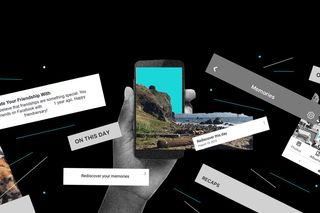
Nostalgia Notifications On Social Media Apps Are Making Pandemic‑Era Anxiety Worse
Do we really need to see pictures from the holiday we took on this day two years ago?

It’s another afternoon locked up at home. Anitha Madhivanan, an HR executive, hears her phone ping while she contemplates taking a break from work. It’s Google Photos, wanting to show her pictures from a few years ago. Pictures of her outdoors with her friends – without a mask, and with a smile that you could actually see.
“These kinds of photos make me go ‘aww’ for about 10 seconds before I start missing that part of my life and get sad,” she says.
The first case of coronavirus in India was reported in January. One Janata curfew, four lockdowns named like the Godfather movies, and two Unlocks later, we’ve retreated back into our homes again. The cases are still on the rise every day. The realization that friendships, jobs, the economy, and our sanity might not survive this pandemic has hit home.
For those of us who can afford it, staying indoors is a matter of civic responsibility. Undeniably, our phones have become our eyes, ears and legs. We get Covid19 updates through them, and we find out which grocery stores have restocked. Every day, we try to process the dystopian reality that our phones present to us. Compared to it all, the memories of yesterday feel unreal and unrelatable.
Not for our apps, though. Based on the notifications we receive every day, it seems like they simply refuse to let go of our past.
Facebook wants us to celebrate friends we can’t meet. Netflix wants us to watch dystopian movies that used to be fun, but are now terrifying. LinkedIn wants us to congratulate someone for completing a decade in a job they just lost. The data that we’ve fed into these apps has clearly not caught up with reality. In the face of an uncertain future, the cheerful auto-generated photos that pop up from nowhere suddenly feel like triggers for sadness.
Related on The Swaddle:
Why Lockdown Has Us Doing Things We Loved as Children
“There’s just not enough distraction now. It’s natural that certain memories that might have just caused a small twinge before would suddenly elicit an amplified reaction now,” said Meghana Devotta, a therapist and researcher at Kaha Mind, a mental health platform.
These notifications are designed to give its users a pleasant walk down the memory lane, whether they want it or not. After all, nostalgia makes you spend more time and money on things. And with persistent, in-your-face notifications , it is quite difficult not to succumb. A recent study found that most people who retreat into nostalgia are dissatisfied with their current lives. And, in the middle of a pandemic, where recreating this nostalgia is not an option, this dissatisfaction is only amplified further.
This tech-induced reminiscence can be attributed to a phenomenon called ‘anticipatory pleasure,’ which refers to the pleasure derived from the thought of a future activity, according to Dr. Manoj Kumar Sharma, a clinical psychology professor and coordinator at Service for Healthy Use of Technology (SHUT) clinic at NIMHANS.
“There is a lot of stress right now, and people are looking for different avenues of wellbeing. These avenues may include, say, looking at old memories. That feeling of goodness that comes from a past memory? Sometimes it’s converted into anticipatory pleasure when we visualize ourselves doing the same in the future,” he says.
In general, such anticipatory pleasure is good; it serves to keep us optimistic and happy. The problem arises when we are unable to translate it into reality. Dr. Sharma points out that this could lead to two outcomes: One, within the limited options available, people find pleasurable moments in the present and hope to expand it in the future. Or two, they find that no pleasure is available right now, and a sense of pessimism takes over. Devotta, in fact, reports an increase in the number of clients who are anxious about reworking their plans and rethinking their lives.
“It completely depends on the individual’s coping mechanisms, personality, and the immediate environment,” Dr. Sharma adds. “Even how your family members are coping feeds into these reactions.”
A cursory survey on social media (ironically) asking people how they felt when encountering nostalgia-laden notifications produced a variety of responses — from happiness to wistfulness to despair. To explain this range of emotions, Devotta says, “What’s happening here is that these kinds of reminders have become lightning rods for our moods. When you’re in a good place, you feel good when you see them. When you’re in an anxious place, they may induce further anxiety.”
The best of plans go awry, they say. This is especially true in a global crisis. Priyanka Agarwal, author and freelance writer, felt like she was finally living her purpose and looked forward to what this year would bring her. For many like her, reminders of this derailment hit hard. “Not going to lie, these app reminders make me desperately want to go back to my past – a safer, more familiar space,” she says.
It is tempting to scroll through our Facebook feeds from 2018 and binge-watch F.R.I.E.N.D.S again. With nothing much to do, doom scrolling just takes over. With a ‘novel’ virus causing ‘unprecedented’ changes in our world, should we be spending time indulging these apps that cocoon us in the past then?
“There is no right or wrong way to react. The same memories/possibilities may mean different things at different times. What made you excited yesterday may make you angry today – it is not a linear process,” says Devotta. “Acceptance plays a big part. It’s important to sit with these feelings that pop up.”
Related on The Swaddle:
Why Do We Reminisce About the Good Old Days?
The best way to process these reactions, according to Devotta, is consciously making meaning out of these memories. Calling someone to discuss them with and having real conversations might reduce the feelings of despair and helplessness. Dr. Sharma suggests maintaining a list of people who understand and support us in times of crisis like this. It can be incredibly heartening to see your support system on paper, even if you can’t see them in person.
He also points out that while so much of our life migrates to the digital realm, it is important to also find relaxation in the offline world. “Work on some small part of your life everyday. Create a balanced schedule that takes care of your physical and physiological health,” he says. “If you do feel signs of psychological distress – constant sadness or mood swings for example, there is fortunately plenty of professional help available online right now.”
“Find out what works for you; calibrate your settings. Keep modifying them based on the mental space you’re in,” says Devotta. In times of crisis, it’s best to take it one day at a time. Tomorrow is a brand new day, with brand new notifications.
Ramya is an independent writer who writes about tech, mental health and gender. Reach her on Twitter, Facebook and Instagram @ramyamkn.
Related


A Person’s Health, Not Their Weight Or Size, Should Determine Obesity: New Canadian Health Guidelines
